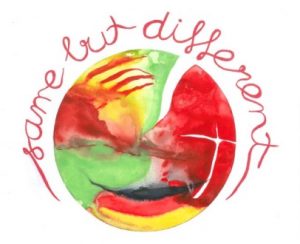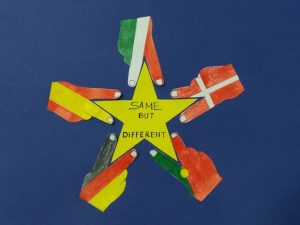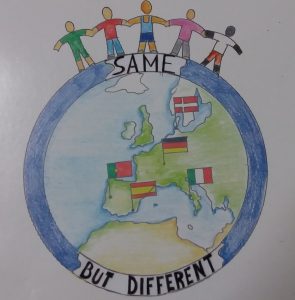|
PROJETO “Same but different” do programa Erasmus+
A parceria deste projeto, que decorre entre setembro de 2016 e setembro de 2018, é composta por Portugal, Espanha, Itália, Dinamarca e Alemanha (país coordenador), sendo o inglês a língua franca utilizada pois faz parte do currículo de todas as escolas envolvidas. A maioria das escolas parceiras enfrenta uma realidade multicultural na vida cotidiana, na qual se verifica que os alunos entram em contato com várias culturas sem realmente as conhecer. Muitas vezes são influenciados por estereótipos ou preconceitos, através dos meios de comunicação, sem estarem conscientes disso. Torna-se, então, necessário que professores e família capacitem os jovens para participar de forma responsável na sociedade civil. Os objetivos deste projeto são fomentar uma melhor compreensão entre as pessoas e as culturas, mostrar as vantagens da diversidade e, finalmente, ajudar a resolver e prevenir conflitos interculturais. Refletir e, portanto, desenvolver uma consciência para a própria cultura é uma condição para enfrentar e respeitar diferentes formas de viver. Respeito e tolerância é o que precisamos para crescer numa Europa diversificada. Como os nossos alunos, que apresentam idades compreendidas entre os 13 e os 17 anos, estão à procura de identidade e orientação, pretende-se despertar a sua curiosidade sobre diversos estilos de vida através de métodos de aprendizagem baseados em jogos interculturais. Agir e reagir em jogos e exercícios também fomentará a compreensão mútua de maneira cognitiva, visto que os alunos dos países parceiros aprenderão a refletir e encontrar compromissos, aceitar outras opiniões e negociar termos de interesse, resolvendo eventuais conflitos. Valores como amizade, responsabilidade e liberdade podem ser melhor experimentados nas ocasiões de intercâmbio nas quais os alunos se encontram cara a cara. Neste projeto acredita-se firmemente que trabalhar com os nossos parceiros irá abrir perspetivas, para que seja facilitada uma eventual procura de emprego em toda a Europa. O mundo digital é um fator chave da convivência no século XXI. Assim, outra parte importante deste projeto será ensinar “netiqueta” (em emails, chats, etc.), lutar contra o cyber-bullying e promover o uso responsável de meios de comunicação digitais. Os alunos trabalharão em equipas internacionais na plataforma eTwinning. Atividades transnacionais, encontros face a face e hospedagem em famílias estrangeiras permitem experiências de primeira mão com outros ambientes socioculturais, melhorando a empatia e a mudança de perspetiva. Acredita-se firmemente que este projeto oferece oportunidades para que sejam desenvolvidas apetências de comunicação e linguagem, independentemente do género, raça, religião ou necessidades especiais. Isso permite que professores e alunos aprendam com seus colegas europeus e trabalhem como multiplicadores nas suas escolas. Os resultados serão partilhados entre as escolas e as autoridades locais, a fim de alargar a divulgação dos conhecimentos adquiridos dentro da respetiva comunidade. A Coordenadora do projeto
Versão inglesa
The partnership of this project, which runs from September 2016 to September 2018, is composed of Portugal, Spain, Italy, Denmark and Germany (coordinating country). Different activities are planned during the project in order to strengthen interactive and communicative competence in foreign languages using English as a lingua franca. We need to realize that our students get in touch with several cultures without really knowing them. Often they are influenced by stereotypes or prejudices without being aware of it, in everyday’s school life, in the public and social media. It is obvious that teachers and parents need to enable the youth to participate responsibly in the civil society without fear. Our objective is to foster better understanding between people and cultures, to show the profits of diversity and finally to help resolve and prevent intercultural conflicts. As our students (13-17years) are looking for identity and orientation, we want to arouse their curiosity about diverse lifestyles by learning methods based on intercultural games. Reflecting and therefore developing awareness for one’s own culture is a condition to face and respect different ways of living. Respect and tolerance is what we need to grow up in a diverse Europe. The method of playing intercultural games seems to be perfect in this context because borders and prejudices will be abolished due to emotional and holistic learning. Students will learn to discuss their criteria’s and find compromises, accept other opinions and negotiate terms of interest. Values like friendship, responsibility, freedom and liberty can better be experienced when you meet face to face. We strongly believe that working with our partners will open everybody’s possibilities to be mobile when they start looking for a job all over Europe. The digital world is a key factor of living together in the 21st century. Therefore another important part of our project will be to teach netiquette (in mails, chats, etc.), fight cyber-bullying and foster the responsible use of digital media. Students will work in international teams on the eTwinning platform. Transnational activities, face to face meetings and being hosted in foreign families allow for first hand experiences with other socio-cultural backgrounds improving empathy and change of perspective. We strongly believe that this project offers opportunities to staff and students to develop their communication and language skills regardless of gender, race, religion or disability. This allows both teachers and students to learn from their European counterparts and work as multipliers in their schools. The results will be shared throughout schools and local authorities in order to promote new knowledge as wide as possible within the local community. Coordinator teacher, |
Escolas Participantes no Projeto
I Concurso de Logótipos entre alunos do 9º Ano Primeiro classificado – Alexandre Monteiro 9.ºD
Segundo classificado – André Pinto – 9.ºA
Notícias do Projeto Eramus+ – Primeira reunião transnacional |


 O projeto “Same but different”, do programa Erasmus+, abre diversas possibilidades de interação e reflexão, abordando importantes objetivos estratégicos proclamados na Estratégia 2020 da União Europeia, nomeadamente integração, inclusão e proteção social para combater a pobreza e a exclusão social. É também um desafio para este projeto reduzir a taxa de abandono escolar precoce, o que contribuirá para que as crianças vivam com mais dignidade.
O projeto “Same but different”, do programa Erasmus+, abre diversas possibilidades de interação e reflexão, abordando importantes objetivos estratégicos proclamados na Estratégia 2020 da União Europeia, nomeadamente integração, inclusão e proteção social para combater a pobreza e a exclusão social. É também um desafio para este projeto reduzir a taxa de abandono escolar precoce, o que contribuirá para que as crianças vivam com mais dignidade.


 I.S.I.S.S. E.Mattei – Aversa
I.S.I.S.S. E.Mattei – Aversa
 NS Torredembarra – Torredembarra
NS Torredembarra – Torredembarra
